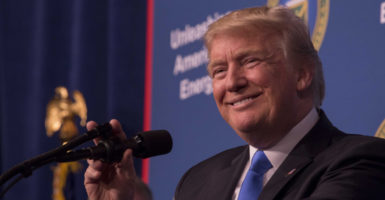The Justice Department fulfilled President Donald Trump’s promise to provide clear guidance on the administration’s commitment to restore robust protection of religious freedom across all federal agencies and executive departments Friday.
This fix was sorely needed in the wake of actions by President Barack Obama’s administration that harmed Americans’ religious liberty.
The May 4 executive order that Trump signed in the Rose Garden and Friday’s guidance from the Justice Department clarified what should have been clear all along: that as Americans, we have the right not only to worship according to our consciences, but to publicly live out our beliefs. This includes the right to think, to speak, and to act in accordance with our beliefs in every sphere of life, including in schools, in federal workplaces, in nonprofit organizations, and in for-profit companies.
A number of Obama-era policies curtailed that right, including by forcing religious employers (both closely held companies and nonprofits) to fund abortion-inducing drugs and contraception under Obamacare, in violation of their consciences.
The Obama administration also winnowed the definition of religious freedom down to the narrow idea of “freedom of worship.” This was rebutted in the first line of Attorney General Jeff Sessions’ memorandum where he described religious liberty as “a foundational principle of enduring importance in America” that “is in its nature an unalienable right.”
The attorney general recalled the words of Founding Father James Madison that the duty owed to one’s creator is “precedent, both in order of time and in degree of obligation, to the claims of Civil Society.” With this strong language, the attorney general has taken a significant step toward restoring a correct understanding of the relationship between people of faith and the government.
The memorandum to the Justice Department’s guidance goes further by outlining 20 principles of religious liberty. Among these are the principles that religious liberty includes both acting and abstaining from acting (Principle 2), that alleged “third-party harms” do not automatically override religious liberty (Principle 15), and that religious organizations can hire according to their beliefs and mission (Principle 19). This is a particularly important point as religious entities like schools must ensure that their employees uphold their codes of conduct in order to be faithful to their missions.
The guidance from the Justice Department also reaffirms the high standard that Congress enacted for federal government actions when it passed the Religious Freedom Restoration Act—the test of “strict scrutiny.” Under this highest level of judicial review, if a government policy imposes a substantial burden on the free exercise of religion, it must demonstrate that the government has a compelling interest and that it has carried out its policy through the least restrictive means.
The Supreme Court applied this standard in Sherbert v. Verner. The court held that the state of South Carolina violated the religious freedom of a Seventh-day Adventist when it denied her unemployment benefits even though her religious beliefs compelled her to decline her employer’s request that she work on Saturdays.
Congress passed the Religious Freedom Restoration Act in 1993 in response to the Supreme Court’s 1990 decision in Employment Division v. Smith, which had lowered the threshold for government policies that burden religion. Sessions stated: “Except in the narrowest of circumstances, no one should be forced to choose between living out his or her faith and complying with the law.”
Now, like then, Congress should act to protect religious freedom from new challenges as a result of government’s redefinition of marriage.
Donald Verrilli, Obama’s solicitor general, acknowledged during the Supreme Court case Obergefell v. Hodges that those who simply disagree with the government’s new policy on marriage could be in jeopardy of losing their tax exemption. Verrilli was acknowledging that if the government begins to enact policies that promote same-sex marriage as orthodoxy, it must either provide a way out for religious dissenters or infringe on their religious freedom.
The Trump administration has fulfilled its promise to uphold religious freedom during the president’s time in office. But, Americans need our representatives to provide permanent, robust protections of our first freedom through legislation.
Congress can pass the First Amendment Defense Act to protect individuals and groups from being penalized by the federal government in tax treatment as well as in accrediting, loans, licensing, distribution of grants and contracts, and employment because of their religious beliefs that marriage is between one man and one woman.
Congress can also pass the Child Welfare Provider Inclusion Act to protect faith-based agencies that find homes for orphans and foster children from hostile legal actions by groups like the American Civil Liberties Union.
All Americans benefit from the services that are provided by an estimated 350,000 religious congregations that serve over 70 million people each year. In addition, faith-based organizations provide services to the U.S. economy that are valued at $1.2 trillion, more than Google, Apple, and Amazon combined. These groups—whether they are Jewish, Christian, Muslim, or other—should be able to serve their communities without sacrificing their religious beliefs.
The Trump administration has reversed the wrong direction of the Obama years by unequivocally stating its commitment to protecting religious freedom. Congress should follow suit. Our first freedom is the foundation of our country’s civility and religious diversity. All branches of government should respect it at all times.
Donald Verrilli’s title has been corrected in this article.




























